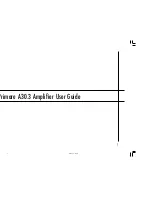
Information subject to change
96-8005353_02-17-2022
8504 OPERATOR’S MANUAL – SECTION 6
22
2.
Place the Follower amplifier on top of the
Master amplifier, and then connect the bus
bar (from the 8504 Multi-amp Kit) between the
GND output terminals of the Master and Fol
-
lower amplifiers. See
Figure 6.8.
A.
Remove the back-panel output covers from
both amplifiers.
B.
Remove the 3/8-inch nuts from the GND
terminals on both amplifiers.
C.
Install the bus bar across the GND termi
-
nals of the Master and Follower amplifiers.
D. Replace the 3/8-inch nuts on both output
terminals.
IMPORTANT: Torque the nuts
to 10 lbs./foot. DO NOT connect to a
load at this time.
3. Connect the Parallel 9-pin D-sub cable (DB9
cable labeled “Parallel” from the 8504 Multi-
amp Kit) from the back-panel Interconnect B
port on the Master amplifier to the Interconnect
A port on the Follower amplifier.
Amplifier Gain Testing
Gain testing can be performed using an oscillo
-
scope or a floating digital multimeter with a resolu
-
tion of at least three digits. Both testing methods
are provided below.
Testing Using an Oscilloscope
1.
Connect from a signal generator to the BNC or
WECO signal input connector on the back panel
of the Master amplifier. Note that if the WECO
connector is used for signal input, DIP switch #1
on the Master amplifier should be placed in the
DOWN (OFF) position and DIP switch #2 should
be placed in the UP (ON) position.
2.
Turn down the level of your signal source.
3.
Make sure the back panel breaker switch on
both amplifiers is in the ON position, and then
press the Standby-Run switch on each ampli
-
fier’s front panel to energize the amplifiers.
4.
Wait for the green RUN LED to illuminate on
the amplifier.
5.
Connect channel one of the oscilloscope be
-
tween the Master amplifier’s Output connector
and the GND bus bar.
6.
Adjust your signal source to input a 1 kHz, 2.5
Vrms sinewave into the Master amplifier input.
The measured output should be at or very near
to 100 Vrms.
Figure 6.8 – Connecting the two amplifiers for parallel system testing
















































